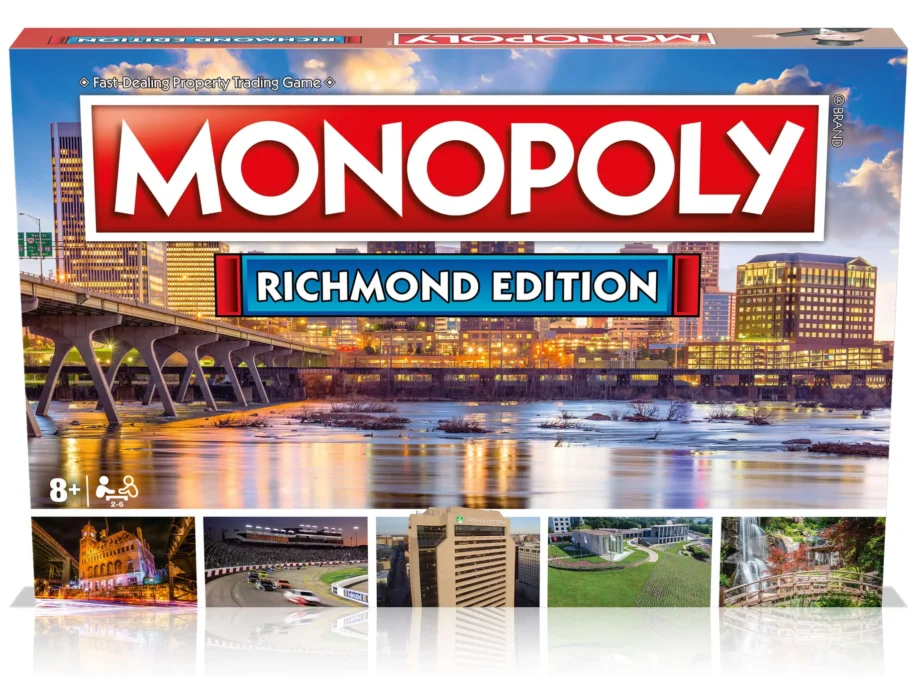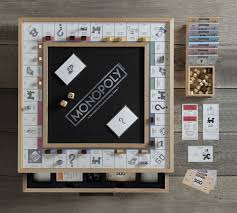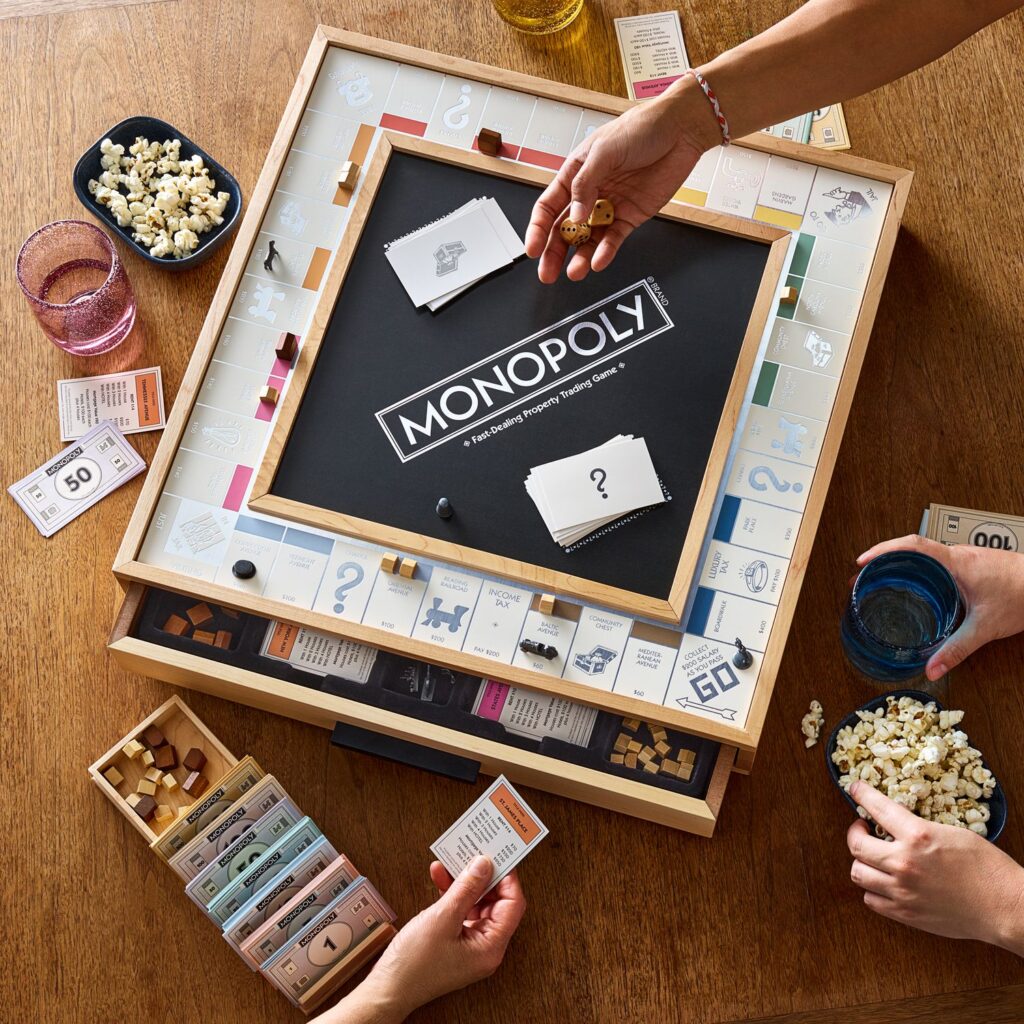
Own, sell, fantasize, and scheme your way to financial success with Monopoly! Put your favorite Monopoly token on Go and roll the dice to own everything! To win, this beloved family board game uses Monopoly gameplay to buy, sell, and trade properties. A chance or community card can change the game.
They can make players rich or imprison them! Game for the next Family Game Night? Family Game Night favorites include Monopoly. For kids 8 and older, it’s a great family present and indoor activity. Hasbro Gaming, Monopoly, the gameboard arrangement, the four corner squares, Mr. Monopoly, and all of the board and playing pieces are trademarks of Hasbro.
- An essential game for family game nights is FAST-DEALING PROPERTY TRADING! With the Monopoly board game, players can buy, sell, fantasize, and plot their way to financial success
- WIN BY BUYING, SELLING, AND TRADE: The goal of the adult and children ages 8 and above Monopoly game is to build an empire by competing to buy out neighborhoods, sell properties, charge rent, and so on
- CONSTRUCT HOUSES AND HOTELS: Enjoy the sensation of an adversary landing on your property. In this popular family board game, players can accumulate more rent money by building more. Cha-ching!
- QUICK ANSWER: Eight tokens are included, including the Top Hat, T-Rex or Thimble, Race Car, Penguin, Scotty, Hazel, Race Car, and Rubber Ducky
- FAVORITE FOR FAMILY GAME NIGHT: This original Monopoly board game is a favorite for Family Game Night or any other indoor fun, and it also makes a wonderful gift for youngsters and families
Monopoly Gaming Board

There are 40 spots on the Monopoly game board in total:
- 28 slots for properties
- Three locations for Community Chests
- Three areas of change
- Two tax areas: income tax and luxury tax
- GO, Jail/Just Visiting, Free Parking, and Go to Jail are the four corner spots.
There are four railroads, two utilities, and twenty-two roadway spaces (divided into eight color groups) among the property spaces.
The objective of the real estate board game Monopoly, which can be played by two to eight players, is to maintain financial stability while driving rivals into bankruptcy through the purchase and development of real estate.
Ten little rectangles on each side of the square board represent properties, utilities, railroads, jails, and other places and events. Each player starts with a specific amount of play money and moves across the board based on a pair of dice. Players must pay rent if they land on another’s property.
Any player who lands on an unowned property can buy it. A player who lands on non-property squares must draw a card, which may be good or bad. A player can enhance a monopoly, which is a set of properties. Property renovations greatly increase rental prices. Players move across the board until they run out of money. Bankruptcy ends the game. The winner is last on the board.
In 1935, jobless heating engineer Charles B. Darrow sold Monopoly, the best-selling privately patented board game in history, to Parker Brothers. The game became popular in the US during the Great Depression. Before that, unofficial versions of a similar game circulated in the US. The majority were based on Lizzie G. Magie’s 1904 board game The Landlord’s Game.
She updated and enlarged her game patent in 1924. Magie’s original game didn’t have a monopoly; instead, it showed how avaricious landlords could exploit renters. Magie proposed a single property tax to prevent Landlord’s Game exploitation. Land speculation opponents hotly debated this as the cause of economic inequality.
Handcrafted board games like the Landlord’s Game were used in the early 20th century. Other property monopolization versions appeared. This version was promoted by brothers Louis and Fred Thun, who gave up on their 1904 patent attempt after learning about Magie’s 1904 patent, and Dan Layman, who called his game Finance but did not file for a patent.
Darrow used inspiration from earlier Monopoly variants to sell his version to northeastern US retailers between 1933 and 1934. Demand immediately surpassed his ability to produce game sets in huge quantities, but Parker Brothers needed numerous trials to see them as worthwhile.
Parker Brothers advertised Monopoly as the product of an unemployed engineer searching for an inexpensive way to entertain himself amid a financial crisis after buying it from Darrow. Parker Brothers settled Monopoly investor lawsuits.
Monopoly gained popularity in many more countries. North American properties were named after Atlantic City, New Jersey streets. For instance, Marvin Gardens is a mispronunciation of Atlantic City’s Marven Gardens. International sets can be changed to depict a nearby city; the British version uses London’s streets. Street names are often replaced with local monuments and attractions in Monopoly games set in other North American cities, such as Chicago.
Play

Players choose their game pieces and receive an equal amount of starting money at the start of each game. To find how many spaces they are to go in a clockwise manner, each player rolls two six-sided dice in turn. If the player rolls three consecutive doubles, they will go straight to jail (no spaces moved on the third roll). However, rolling two doubles provides the player the chance to roll again after they have moved.
Every time a player passes GO, they can earn $200, but if they land on “Go to Jail,” they have to pay the $200 right away. If a player gets locked up, they can get out by utilizing special get-out-of-jail cards, rolling doubles, or paying $50.
A player must pay the fine if they haven’t rolled doubles in three tries to avoid being jailed. After that, they can move the amount of spaces indicated by their most recent dice roll. The player can move and get out of jail if they roll doubles, but they cannot roll twice in a row.
The amount displayed on the Luxury Tax and Income Tax squares must be paid by players who land on them. When a player lands on a Community Chest or Chance Square, they can pick up the matching card and proceed as directed.
The player can pay the specified purchase amount to the bank to obtain the title deed when they land on property spots. If they decide not to buy the property, an auction will be held to sell the designated property. This is up to bids from all players, and the winning bidder as long as they have the money to buy the property takes ownership.
From this point on, any player who lands on the property is required to pay the owner the rent specified on the title deed, which varies based on how many homes or hotels are constructed there. The following is the rent for specific properties:
The owner will receive $25 for a single railroad, $50 for two, $100 for three, and $200 for all four.
Utility payments: if both utilities are owned, the rent due is ten times the dice number.
Past Events
Launched in 1935, Monopoly is still published by Hasbro today. TeamLava developed the version that is available on our website. Board games include games like Monopoly.
Additional board games
If you enjoy Monopoly, Solitaire Paradise offers many other timeless board games that you should check out. Take UNO and Rummikub, for instance. Don’t forget about timeless games like FreeCell and Minesweeper either.
System prerequisites
Any contemporary browser, any kind of device (desktop, tablet, mobile), and any operating system (Windows, macOS, Linux, Android, iOS, etc.) can be used to play Monopoly.
